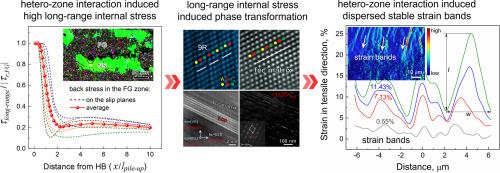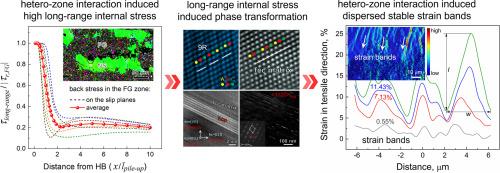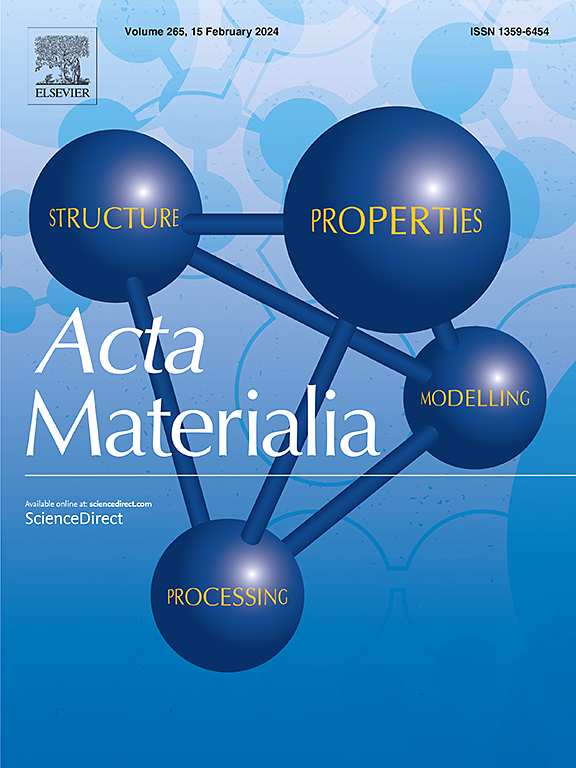Unusual deformation mechanisms evoked by hetero-zone interaction in a heterostructured FCC high-entropy alloy
IF 9.3
1区 材料科学
Q1 MATERIALS SCIENCE, MULTIDISCIPLINARY
引用次数: 0
Abstract
Understanding the synergistic mechanical effects of heterostructured materials remains challenging due to the complexities in the underlying deformation mechanisms, which are usually diverse, activated at different length scales and possibly interacting. Here, we unravel a deformation fundamental for heterostructures: in addition to the direct contribution on strength, hetero-zone interaction and the development of long-range internal stress could assist in evoking extra plastic mechanisms that are difficult to activate in their homogeneous counterparts. Specifically, the deformation of a heterostructure in Al0.1CoCrFeNi alloy, featuring nanostructured hard lamellae embedded in fine-grained soft matrix, is taken as an example for study. Drawing from experimental insights, the long-range internal stress buildup at elastoplastic transition stage due to intense dislocation pile-ups against hetero-zone boundary, which increases yield strength significantly, is theoretically analyzed. At the plastic stage, the high internal stress helps to activate phase transformation in the fine-grained zones, and the inter-zone constraint leads to form dispersed stable strain bands in the nanostructured zones. These extra mechanisms, together with enhanced deformation twinning, facilitate work hardening and coordinate the strain partitioning between zones, imparting improved ductility at high flow stress. These findings indicate a principle for heterostructural design: introducing strong hetero-zone interaction to enhance internal stress and thereby invoke new deformation mechanisms.


异质结构 FCC 高熵合金中异质区相互作用诱发的异常变形机制
由于基本变形机制的复杂性,理解异质结构材料的协同机械效应仍具有挑战性,这些机制通常多种多样,在不同的长度尺度上激活,并可能相互作用。在此,我们揭示了异质结构的变形基本原理:除了对强度的直接贡献外,异质区相互作用和长程内应力的发展还有助于唤起同质材料难以激活的额外塑性机制。具体来说,我们以 Al0.1CoCrFeNi 合金中的异质结构变形为例进行研究,该异质结构的特点是纳米结构的硬薄片嵌入细粒软基体中。借鉴实验结果,从理论上分析了在弹塑性转变阶段,由于异质区边界的密集位错堆积而导致的长程内应力积聚,从而显著提高了屈服强度。在塑性阶段,高内应力有助于激活细晶粒区的相变,而区间约束则导致在纳米结构区形成分散的稳定应变带。这些额外的机制与增强的变形孪晶一起,促进了加工硬化,并协调了各区之间的应变分配,从而提高了高流动应力下的延展性。这些发现表明了异质结构设计的一个原则:引入强大的异质区相互作用来增强内应力,从而激发新的变形机制。
本文章由计算机程序翻译,如有差异,请以英文原文为准。
求助全文
约1分钟内获得全文
求助全文
来源期刊

Acta Materialia
工程技术-材料科学:综合
CiteScore
16.10
自引率
8.50%
发文量
801
审稿时长
53 days
期刊介绍:
Acta Materialia serves as a platform for publishing full-length, original papers and commissioned overviews that contribute to a profound understanding of the correlation between the processing, structure, and properties of inorganic materials. The journal seeks papers with high impact potential or those that significantly propel the field forward. The scope includes the atomic and molecular arrangements, chemical and electronic structures, and microstructure of materials, focusing on their mechanical or functional behavior across all length scales, including nanostructures.
 求助内容:
求助内容: 应助结果提醒方式:
应助结果提醒方式:


